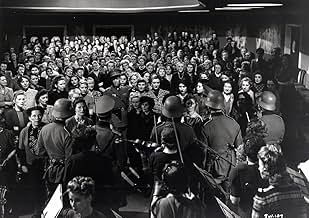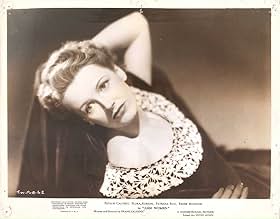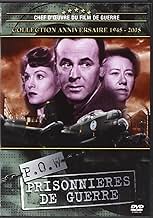Füge eine Handlung in deiner Sprache hinzuWomen in a French internment camp conceal downed British airmen from German soldiers, and try to help them escape. Produced by Edward Black. Written and directed by Frank Launder.Women in a French internment camp conceal downed British airmen from German soldiers, and try to help them escape. Produced by Edward Black. Written and directed by Frank Launder.Women in a French internment camp conceal downed British airmen from German soldiers, and try to help them escape. Produced by Edward Black. Written and directed by Frank Launder.
- Regie
- Drehbuch
- Hauptbesetzung
- Dave Kennedy
- (as Rob Arden)
- Frau Holweg
- (as Christina Forbes)
Empfohlene Bewertungen
After a slow and rather class-conscious opening, the story develops into a stylish, sometimes funny and often sexy battle of wits against the usual hapless German guards and the occasional informer. Along the way, the camera lingers wistfully on every stockinged thigh and lacy bosom, but somehow everyone manages to keep thinking of England at least some of the time.
A top cast of female leads.
There are definitely not 2,000 women in this place. There are, however, a group of irritating women who deserve to be incarcerated. Phyllis Calvert as "Freda" speaks in a ghastly posh accent for the whole film and is quite annoying. Jean Kent as "Bridie" is the funniest to watch while Renee Houston as "Maude" is far better as a cabaret singer/performer than as a wise-cracking street-girl. Betty Jardine does well as section supervisor "Teresa" but there are no great performances in this story. Patricia Roc as "Rosemary" comes off as the best character but she shouldn't be in the film in the first place. She is caught by the French signalling to German airplanes to blow up an ammunition hold. She's in the wrong goddam prison!
An attempt is made at sentimentalism by having somebody sing "There's no place like home" whilst we pan across several of the women's faces. It's rubbish. Another moment that doesn't work happens when Muriel (Flora Robson) and Clairen (Muriel Aked) are taken away to a German prison camp. I'm afraid that we just don't care! There is no drama. The men have absolutely no presence and come across as slightly wimpish.
The ending is laughably bad. I'm not referring to the plot but to the rendition of "There'll always be an England". However, the film is lightweight fluff that passes the time and it's OK as that.
Tenko this ain't!
The women prisoners look well fed, wearing the best clothes and heavily made up, I can't imagine the Germans treated any British female prisoners like this. OK it was made during the war and there is perhaps a bit of propaganda about it, but to say it's a comedy is laughable in itself.
I can't believe the like of Dame Flora, Phyllis Calvert and Jean Kent agreed to do this daft piece of tosh. There is one scene when one of the men are seen smoking a pipe, as if.
I'm saying avoid it but don't expect anything close to factual.
It's full of the sort of "There'll always be an England" stiff upper lip stuff that looks so kitch these days, and yet there's also a feeling of release for these women since there are no men around.
Sadly, some RAF men accidentally parachute into the camp and the women have to hide them from the Germans. The men are undercast and a bit dreary, but they wouldn't stand a chance against the cream of British character actresses anyway.
The rest of the film concerns the women's attempts to smuggle the men out of the camp. The plot however is irrelevent. What matters is the way these actresses work without having to compete for billing with any male star.
The film is fun, risque and the best British romp before Tom Jones.
Some RAF men parachute into the area and sneak into the hotel. It falls to the women to hide them and then to help them escape.
The marvelous cast of women includes Flora Robson, Phyllis Calvert, Patricia Roc, Renee Houston, and Jean Kent. Kent plays a floozie trying to seduce one of the German soldiers.
Good film, and different. The last scene is very stirring!
Wusstest du schon
- WissenswertesThis movie received its initial telecasts in Los Angeles, California on Monday, January 15, 1951 on KECA (Channel 7) and in New York City, New York on Sunday, February 18, 1951 on the DuMont Television Network's International Playhouse on WABD (Channel 5).
- Zitate
Mrs. Hadfield: You must be dying for a cup of tea, you poor things.
Freda Thompson: You've got some tea?
Mrs. Hadfield: I exchanged a pair of corsets for a quarter of a pound, last week.
- Alternative VersionenAlso known as "One Thousand Women" in a shorter version of the same film which omits the Patricia Roc character story-line.
- VerbindungenFeatured in A Bit of Scarlet (1997)
Top-Auswahl
Details
- Erscheinungsdatum
- Herkunftsland
- Sprachen
- Auch bekannt als
- House of 1,000 Women
- Drehorte
- Gainsborough Studios, Islington, London, England, Vereinigtes Königreich(studio: made at The Gainsborough Studios, London)
- Produktionsfirma
- Weitere beteiligte Unternehmen bei IMDbPro anzeigen
- Laufzeit1 Stunde 37 Minuten
- Farbe
- Seitenverhältnis
- 1.37 : 1
































